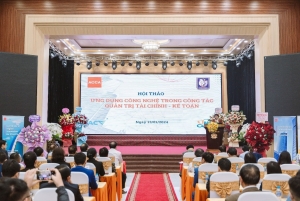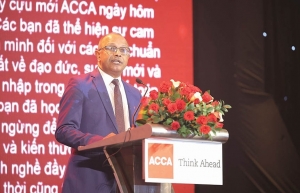A transition worth doing properly
The ACCA has outlined seven strategic priorities to reshape the future. How do these integrate with the global agenda for environmental and digital transformation?
Abrol: It’s often misunderstood that accountants only work behind the scenes. As the world’s largest professional accounting organisation, The ACCA plays a key role in guiding businesses towards sustainable practices that benefit all stakeholders. Accountants enhance transparency, accountability in business performance, and advocate for strategies against climate change to promote long-term sustainability.
 |
| Pulkit Abrol, regional director for Asia-Pacific, and Chun Wee Chiew, regional lead for Policy and Insights for Asia-Pacific at the Association of Chartered Certified Accountants (ACCA) |
Accountancy is vital in developing effective reporting standards and supporting regulations that ensure trust in capital markets while addressing environmental and societal changes. This year, the ACCA transitioned from a vision to an ambition statement, aiming to lead the profession through a three-year strategic cycle to meet evolving global stakeholder obligations.
Central to our strategy is redefining the accountant’s role. No longer just back-office positions, accountants are essential in managing digital transformation and environmental sustainability. Effective regulatory standards are essential for a fair transition in these areas.
Accountants are involved in sustainability reporting, assurance, and addressing ethical challenges posed by emerging technologies like AI. The ACCA supports the International Sustainability Standards Board and initiatives to embed sustainability within financial processes.
Digital transformation is essential for sustainable progress. Bridging the digital divide is critical for equitable climate action. The ACCA prioritises the digital transformation of finance, focusing on AI, big data, and blockchain through our training programmes and professional development initiatives.
Regionally speaking, what are the most vital aspects of the ACCA’s policy work?
Chiew: We deliver extensive research and insights globally, always ensuring to incorporate inputs from the Asia-Pacific region. This approach is crucial due to the significant role Asia plays in the global economy. With half the world’s population and a rapidly growing middle class, Asia is projected to generate half of the world’s GDP by 2040. This dynamic region, characterised by its diversity and blend of established and emerging economies, is indispensable to our research and policy work.
Asia-Pacific showcases different approaches to business conduct and talent management, influenced by cultural differences and varying stages of economic development. For instance, Vietnam and China boast unique digital landscapes, while Singapore demonstrates innovative regulatory approaches.
In the race to net-zero, a key focus is ensuring an equitable transition to green energy solutions that address growing global demand while considering historical contributions to climate change.
Our global narrative cannot be complete without covering the Asia-Pacific region. With 780,000 members and students globally, half of whom are in Asia-Pacific, our community in this region is a vital resource. We leverage their expertise, experience, and insights to shape our global research. Understanding and addressing their needs is essential to serve them effectively, making Asia-Pacific central to our work.
Your profession has an important role in shaping the financial and regulatory innovations on the road to net-zero. How seriously is this being taken?
Abrol: The accountancy profession takes its role in the net-zero agenda very seriously. We support regulators globally and amplify the voices of companies and organisations as compliance becomes increasingly critical. Emerging economies like Vietnam face challenges in meeting extensive standards while competing globally.
To address these challenges, we equip our members with the knowledge, tools, and access needed for sustainable finance initiatives. The ACCA advocates on global platforms, addressing environmental, social, and governance aspects of net-zero goals. We offer training in sustainability reporting and green finance, collaborate with the International Sustainability Standards Board, and provide comprehensive sustainability research.
In Vietnam, we have made significant strides towards green and digital transitions. Celebrating 22 years in the country, we established a joint examination scheme with the Ministry of Finance and collaborate with universities like the University of Foreign Trade and the Academy of Finance. Last year, we trained 300 public sector officials on the International Financial Reporting Standards (IFRS) roadmap and policy decisions. We also launched the world’s first Vietnamese language IFRS certificate and partnered with the Department of Vocational Education to integrate sustainability into vocational training.
Our commitment to Vietnam and the global community is central to our strategy of redefining the accountant’s role. Modern accountants are evolving into chief value officers, creating value for all stakeholders, and we are dedicated to fostering a community ready to meet these challenges.
Some of the United Nations’ Sustainable Development Goals (SDGs) have a direct impact on businesses. How does the ACCA support corporates and their leaders in realising these goals?
Chiew: We are deeply committed to the SDGs, focusing on nine of the 17 where we can have the most impact. This commitment is evident in our actions and organisational purpose.
To address SDG 13 on climate action, we support corporates through qualification, learning, and thought leadership. Upskilling is crucial for our members to understand climate change impacts, risks, and opportunities. Our curriculum, continuously updated, includes topics like green finance and environmental impact. This year, we’re incorporating new international standards on sustainability reporting to prepare our members for effective climate action, and we offer continuous learning programmes, including a new sustainability diploma launching this year that consists of four modules.
Our thought leadership provides practical guidance. We addressed Scope 3 emissions 13 years ago in “The Carbon We Are Not Counting” and continue research with reports from COP28 in Dubai. These resources offer practical guides for business leaders, supporting all sectors in tackling climate change.
Much has been said about the increased use of AI, machine learning, big data, and blockchain. Which of these areas demands the most attention in your profession?
Abrol: Investment in upskilling is crucial to keep pace with technological advancements. Robust policies are equally important. In the Asia-Pacific region, particularly ASEAN, there is a significant skill gap. Rapid technological changes, accelerated by the pandemic, and the rise of AI and machine learning in the last 14-16 months, have compounded this issue. Automation adds complexity, raising concerns about how to upskill the workforce to compete with robotics.
Effective policymaking and strong public-private partnerships are vital. Supporting investments in skill development and human capital is essential. We address these challenges through initiatives like our AI monitor, which identifies skill shortages and urgent needs.
Data privacy and security are critical issues. Public and private cloud data systems are expanding, with significant investments by governments in Singapore, Indonesia, and Australia. Ensuring data privacy, government interoperability, and standards such as invoicing are underway. However, regulatory compliance in data privacy and security varies across ASEAN, presenting challenges. Expertise in compliance and ethics is crucial.
Infrastructure development for AI, digital, and blockchain investments is also key. The rapid pace of change demands prompt attention to digital infrastructure needs. We must consider timelines for addressing these gaps and the impact of labour skill shortages over the next five years. Achieving net-zero emissions is a vital goal, and addressing these challenges is essential for the profession and the broader economy.
What policies should the Vietnamese government focus on to increase foreign investment and to promote the digital-green transition?
Chiew: To enhance its appeal to foreign investors and advance the digital-green transition, the Vietnamese government should focus on several key areas.
Firstly, the government has previously demonstrated success in implementing policies such as the feed-in tariff regime, which significantly boosted renewable energy capacity. Such policies made investments highly attractive to both domestic and foreign stakeholders, rapidly increasing renewable energy capacity within five years. However, ensuring the long-term sustainability and cost efficiency of the sector requires ongoing policy adjustments.
In general, foreign investors prioritise profitability, stability, and transparency in policies and regulatory frameworks. Ensuring these attributes in policy execution is essential to building trust and confidence among foreign investors. This approach is critical for any jurisdiction aiming to enhance its attractiveness to foreign capital.
From an accounting and finance perspective, adopting global standards is critical. International standards provide a common language that enhances understanding and trust. Vietnam is making significant progress towards adopting the IFRS, which is vital for attracting foreign investment. The ACCA supports this through various initiatives, including our certification programmes.
Furthermore, the growing emphasis on sustainability highlights the need for international sustainability reporting standards. Investors and stakeholders are increasingly focused on how companies and the public sector communicate their efforts towards achieving net-zero and other sustainability goals.
| The ACCA Asia-Pacific Forum 2024 will be held on May 28-29 at the JW Marriott Hotel in Hanoi. Organised by the ACCA, the forum aims to address global economic, political, and social fluctuations by focusing on human resource development, economic promotion, and sustainable development. The event seeks to build a unified strategy for shared prosperity in the Asia-Pacific region by fostering knowledge exchange and strategic relationships, challenging traditional views of the region’s global role. The forum will receive attendance from government officials, corporate leaders, and experts from various fields, particularly from the Asia-Pacific region. Discussions will centre on promoting green and sustainable economic growth and the future of education through sustainable digital and technological innovations. Renowned speakers will provide insights on leveraging technology for regional trade and using AI in sustainable education. |
 | ACCA Vietnam New Member Ceremony 2023: Shaping a brighter financial future The Association of Chartered Certified Accountants (ACCA) held its 2023 New Member Ceremony with the theme Shaping the Future for A Better World in Ho Chi Minh City and Hanoi on October 19-20. |
 | ACCA partners with VINASME to empower businesses in Nghe An province The Association of Chartered Certified Accountants (ACCA) joined forces with the Vietnam Association of Small and Medium Enterprises (VINASME) on January 13 to organise comprehensive workshops in Vinh city, Nghe An province, a locality near the northernmost part of Vietnam’s north central coastal region. |
 | ACCA report outlines SME agendas for ESG In 2024, the landscape for small and medium-sized enterprises is both promising and challenging. In the heart of Southeast Asia, Vietnam stands at the forefront of economic growth, and has set ambitious growth targets for 2024. |
What the stars mean:
★ Poor ★ ★ Promising ★★★ Good ★★★★ Very good ★★★★★ Exceptional
 Tag:
Tag:
Related Contents
Latest News
More News
- Vietnam, New Zealand seek level-up in ties (February 19, 2026 | 18:06)
- Untapped potential in relations with Indonesia (February 19, 2026 | 17:56)
- German strengths match Vietnamese aspirations (February 19, 2026 | 17:40)
- Kim Long Motor and AOJ Suzhou enter strategic partnership (February 16, 2026 | 13:27)
- Haiphong welcomes long-term Euro investment (February 16, 2026 | 11:31)
- VIFC in Ho Chi Minh City officially launches (February 12, 2026 | 09:00)
- Norfund invests $4 million in Vietnam plastics recycling (February 11, 2026 | 11:51)
- Marico buys 75 per cent of Vietnam skincare startup Skinetiq (February 10, 2026 | 14:44)
- SCIC general director meets with Oman Investment Authority (February 10, 2026 | 14:14)
- G42 and Vietnamese consortium to build national AI infrastructure (February 09, 2026 | 17:32)




















 Mobile Version
Mobile Version